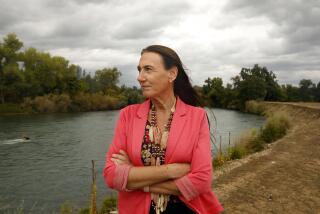Reno Extends Probe of Babbitt’s Action on Casino Plan
- Share via
WASHINGTON — Atty. Gen. Janet Reno extended a preliminary inquiry Thursday into allegations that Interior Secretary Bruce Babbitt rejected a Native American casino project because of contributions to the Democratic Party by its opponents.
The move by Reno gives the Justice Department 90 more days to determine if there is sufficient “specific and credible” evidence of wrongdoing by Babbitt to request the appointment of an independent counsel to investigate the matter.
Babbitt has insisted that his 1995 rejection of a casino application filed by three bands of impoverished Wisconsin Chippewa Indians was entirely lawful and proper and that political considerations did not come into play. His office reiterated that position Thursday.
But Babbitt’s congressional testimony and statements have been at odds with those of another key witness and his own recollection of a crucial meeting has changed.
During the last month, while the Justice Department was conducting an initial 30-day review of the matter, the Senate Governmental Affairs Committee highlighted conflicting accounts of events as part of its inquiry into Democratic fund-raising practices.
“The allegations that there was improper White House or Democratic National Committee influence and that I was a conduit for that influence are demonstrably false,” Babbitt told the Senate panel on Oct. 30.
His testimony clashed with that of an earlier witness, Paul Eckstein, a lawyer who had been hired to lobby for the casino by a racetrack operator and by the Wisconsin tribes, who wanted to acquire the site of a failing dog track in Hudson, Wis., for their gambling operation.
*
Eckstein, a former law partner and longtime friend of Babbitt’s, said that he met with the secretary at the Interior Department on July 14, 1995, and that Babbitt told him Harold M. Ickes, then-White House deputy chief of staff, was pressing him to make a decision on the project that very day. Babbitt mentioned political donations to the Democrats by other Native American tribes, Eckstein testified.
The opponents, who feared that another casino would drain patrons away from their own, ultimately contributed more than $270,000 to the Democrats, most of it in the days after the decision went their way.
Babbitt may have placed himself in legal jeopardy by issuing conflicting statements to the Senate, according to legal experts. In a letter last year to Sen. John McCain (R-Ariz.), he flatly denied telling Eckstein, the Chippewas’ attorney, that Ickes had instructed him to decide the case.
However, in a more recent letter to Senate Committee Chairman Fred Thompson (R-Tenn.) and in his Senate testimony, Babbitt said that he may have invoked Ickes’ name simply to bring his uncomfortable meeting with Eckstein to an end. He said that Ickes never discussed the case with him.
Some lawyers familiar with the case said that they believe the Justice Department review has focused on a federal statute that prohibits false statements to Congress or misleading members of Congress.
In rejecting the casino project, Babbitt ignored the recommendation of the regional office of Interior’s Bureau of Indian Affairs. His decision also came after aides to Ickes had called Interior Department officials three times to check on the status of the case, according to official documents. Donald L. Fowler, former chairman of the Democratic National Committee, has testified that he also called “someone at Interior” about the application that was being opposed by the large tribal donors.
After Reno announced her decision to extend the inquiry, Babbitt spokesman Mike Gauldin said that rejection of the request by the Wisconsin tribes for the casino site was based on policy.
“It was faithful to our policy not to force off-reservation gaming onto any community that is opposed to it, as was the case here,” Gauldin said. “It was reached on the merits, not on the basis of any alleged political influence.”
More to Read
Get the L.A. Times Politics newsletter
Deeply reported insights into legislation, politics and policy from Sacramento, Washington and beyond. In your inbox twice per week.
You may occasionally receive promotional content from the Los Angeles Times.







